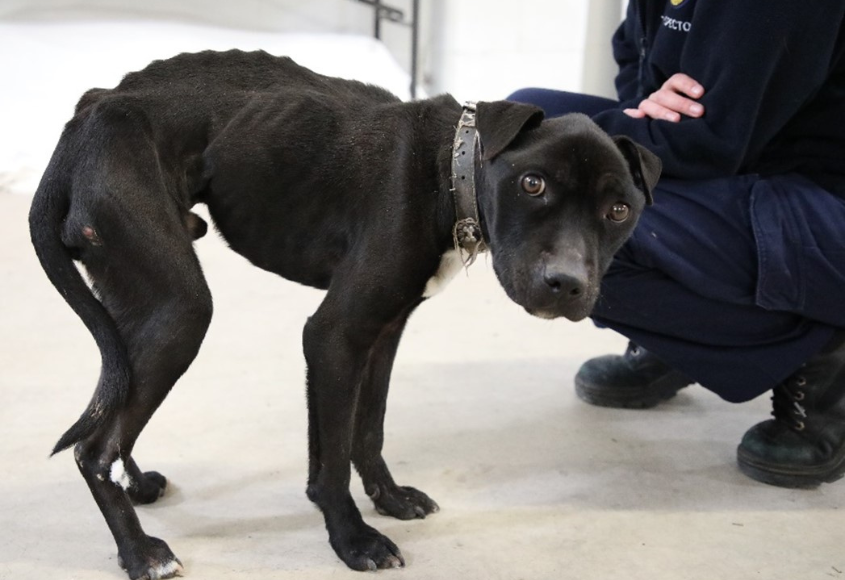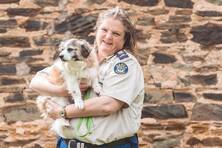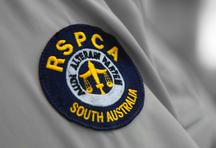Woman convicted for starving dog
January 02, 2024
A northern suburbs woman was today convicted in the Elizabeth Magistrates Court for allowing a young dog to starve to a point where he weighed 8.9kg, less than half the weight he should have been. The woman was arrested under warrant on New Year’s Eve, having failed to attend previous court hearings for the animal cruelty offence she committed more than four years ago.
When surrendered to RSPCA South Australia’s care on 29 August 2019, the severely emaciated Staffordshire Terrier-cross dog, named Jet, had a BCS (body condition score) of 1/9. (A BCS of 5/9 is ideal, while 9/9 is obese and 1/9 is severely emaciated.) The two-year-old male dog’s ribs, hips, spine and skull were all clearly visible.
The examining RSPCA SA veterinarian, Dr Julie Hearn, reported the dog had no fat stores, significant muscle wastage over his entire body, an arched back and bowed legs. Jet was unsteady on his legs, dehydrated, anaemic and had small ulcers on both hocks, identified by Dr Hearn as most likely to be pressure sores.
However, the dog showed no signs of systemic diseases. After two months of being fed an appropriate diet, Jet gained 119% of his initial body weight, bringing him to a healthy weight of 19.5kg. Jet was rehomed in October 2019 and is now six years old.
In a report to the court, Dr Hearn stated the dog would have been suffering from an inadequate diet and starvation for at least one month.
At the time Jet was seized, the now 43-year-old female defendant and a co-accused 44-year-old male defendant (who has an outstanding warrant for his arrest after failing to attend court for this matter) advised the investigating RSPCA SA inspector that they could not afford the dog’s care and that he was not being fed daily. The female defendant told the inspector that she had noticed the dog was losing weight for about two months. The male defendant told the inspector that at one stage he had found the dog lying down and thought the dog had died.
The couple was charged under SA’s Animal Welfare Act with Ill Treatment of an Animal, in failing to provide the dog with appropriate and adequate food. In sentencing today, Magistrate Edward Stratton-Smith said that “dogs are wholly reliant upon their owners” and that it was “important to send a strong message to the community that people must look after their dogs”.
His Honour recorded a penalty that included three days already served in custody (the defendant was also arrested in December for a night). The defendant was ordered to pay prosecution costs of $272 and she is prohibited from owning or having custody of any animals until further order.
RSPCA SA Chief Inspector Andrew Baker described the case as an alarming example of failure to meet an animal’s basic care needs.
“For anyone to allow their pet to get to a state where he’s just skin and bone, can barely stand and weighs less than half of what he should, is shocking on every level,” Mr Baker said.
“It’s hard to know what these two individuals were thinking, when day-after-day they could see their dog starving right in front of them and they did nothing about it.
“If you genuinely cannot afford to feed your animal, or get it to a vet when it needs to see one, then please find the animal an alternate home or surrender it to a reputable organisation like RSPCA.
“We urge people to take responsibility for what’s happening to their animals and to make the call early, well before it gets to the horrendous stage it reached for this poor dog.”
Under SA’s Animal Welfare Act, the maximum penalty for animal cruelty is $20,000 or two years’ imprisonment. For an aggravated cruelty offence, the maximum penalty is $50,000 or four years’ imprisonment.
RSPCA South Australia is the state’s only animal welfare charity with inspectors empowered to prosecute animal cruelty under SA’s Animal Welfare Act.
Members of the public who witness animal cruelty or neglect are urged to immediately call RSPCA’s 24-hour cruelty report hotline on 1300 477 722.
Photo above: Two-year-old Jet when taken into RSPCA SA care in August 2019.




